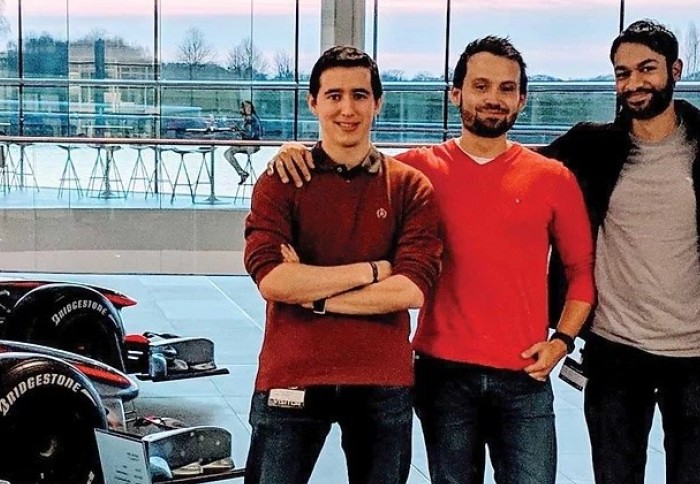Imperial startup Monolith AI raises £8.5m and launches new research with College

AI-assisted engineering company Monolith AI, founded at Imperial, has returned to its alma mater as a research partner following Series A funding.
Monolith AI was founded in 2016 by Imperial’s Professor Francesco Montomoli and Dr Richard Ahlfield, its CEO, to help engineering companies optimise and accelerate the design of components such as automotive parts.
The growing company raised £8.5 million last year in a Series A round. With Imperial’s Dyson School of Design Engineering, it has now won a £500,000 Innovate UK grant.
Its platform offers companies and engineers in fields such as automotive and fast-moving consumer goods an easy way to create machine learning tools that use data on the performance of existing parts to predict how new designs will perform. This reduces the time and cost required to bring new industrial components to market.
The growing company raised £8.5 million last year in a Series A round led by Insight Partners. With Imperial’s Dyson School of Design Engineering, it has now won a £500,000 Innovate UK grant that is funding collaborative research to address manufacturability.
Designing for manufacturability
Component designers are experts at creating parts that perform their functions well, but to discover whether their designs are manufacturable requires a time-consuming and costly process of computer simulation and assessment by a separate set of experts that often ends with designers having to return to the drawing board.
Working with the Dyson School’s Dr Nan Li, Monolith AI is developing a machine learning platform based on manufacturing data that designers of metal parts such as car doors can use to predict, in minutes rather than weeks, whether their designs are manufacturable.
Explainable AI
 A key feature of the platform will be explainability. Machine learning architectures, particularly those based on deep learning and other types of neural network, often function as black boxes, meaning that while they can make intelligent predictions, the reasoning behind these predictions is not accessible to their users.
A key feature of the platform will be explainability. Machine learning architectures, particularly those based on deep learning and other types of neural network, often function as black boxes, meaning that while they can make intelligent predictions, the reasoning behind these predictions is not accessible to their users.
“Knowing that a door is not manufacturable is not enough,” says Monolith AI’s Principal Engineer Dr Joël Henry, who gained his PhD at Imperial. “You need to understand why, and even more importantly how you could change the design and operating conditions to make it manufacturable.”
“Knowing that a door is not manufacturable is not enough,” says Dr Joël Henry. “You need to understand why, and even more importantly what you could change to make it manufacturable.”
The platform is being designed to provide the required explanation using images. Dr Li elaborates: “We might find that if the local thinning of a panel component is too great, more than 15%, it won’t do. Our machine learning based platform won’t just provide a value, but a colourful 3D contour diagram, labelling locations with values.
“Because it looks like what you get as a result of the simulation, it gives the designers information in a form that they are familiar with. It also enables the designers to gain quick insights on how the shape features and processing conditions influence the manufacturing performance, which helps to build designers’ trust in the model.”
Industry-academia partnership

The research will benefit from the combination of Monolith AI’s in-house expertise and the expertise provided by Dr Li, a serial inventor and expert in the manufacturing of lightweight components, whose research is widely used by Imperial’s industrial partners such as TATA Steel and Lotus in the automotive, aerospace, and steel industries.
“Both the machine learning model and the data you train it with are important. But I want to emphasise the importance of the data,” says Dr Li. “We have carried out work on assessing manufacturability with partners such as Shougang and Impression Technologies using physically based simulations and equations that we developed ourselves. Although machine learning can make analysing the data much quicker, it is still essential that we use our domain-specific expertise in engineering metals and composites to define effective data forms and representations.”
The research will use expertise from Monolith AI and Dr Nan Li, a serial inventor and expert in the manufacturing of lightweight components.
Dr Ahlfeld, says: “Large engineering companies collect a lot of data when assessing manufacturability, and our goal is to make that data work to their advantage. This latest funding will allow us to explore this possibility and drive not only the automotive industry, but other sectors forward.”
Imperial regularly works with industrial partners to translate academic expertise into innovations that make a real-world impact on industry and society. Industry partnerships and startup formation are facilitated at the College by the Enterprise Division.
Article text (excluding photos or graphics) © Imperial College London.
Photos and graphics subject to third party copyright used with permission or © Imperial College London.
Reporter
David Silverman
Communications Division